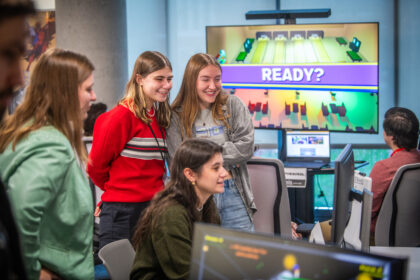‘If you’re having fun, then why not challenge yourself’

“If you’re proud of what you’re working on, then you should not be afraid to show it.”
Sitting at a table in the Academic Commons, Dillon Remuck ’25 excitedly explains how he’s infused his tech-savvy into the University’s Strategic Analytics and Institutional Research office (STAIR) through his work as a researcher.
The computer science and interactive media major has written Python scripts to help automate, diversify, and simplify processes at STAIR, which collects and analyzes data such as course evaluations, the first-year check-in, and the senior survey. STAIR Director Elissa Lu and the team use this data to improve the student experience and inform policies. A big part of Remuck’s job is making his code “generalizable,” or accessible to people who are not necessarily fluent in computer science.
“I’ve had a lot of practice describing my code and what I’ve been working on in a way that anyone can understand,” he says. “That’s very useful because if my boss can understand what I’m working on, then she can help guide me, and even though she can’t help me with the code itself, she can give me ideas for what to evolve into the script.” The automation scripts have supported the buildout of a robust Python library at STAIR.
The office is also using AI to streamline its work. A little bit of code and Chat GPT have helped the office breeze through hundreds of responses to summer advising forms, Remuck says. Instead of reading each document and manually marking which students needed which services, AI completes an hours-long task in just minutes.
“A lot of people are afraid computers will replace everyone, but that’s not true,” Remuck says. “Think of AI like a powerful assistant. It can’t work alone. I have to prompt it, and someone has to analyze the results.”
A focal point of Remuck’s work this year is exploring and pushing the limits of AI in quantitative and qualitative analyses. He has assessed looking into AI for text mining themes in surveys, feedback in course evaluations, and some predictive analyses.
“Dillon has been a self-starter and collaborative partner and has helped trailblaze new territory by being able to independently evaluate tools and programming packages,” says Lu. “He supports research and development because the field of analytics and AI is moving so fast. Big tasks don’t phase him, and no task is too small.”
Across campus, Remuck has shared his STAIR work during the computer science data analytics lecture series, in consulting-type presentations with deans, and to senior leadership.
Security is a big concern of using AI in the workplace, especially with sensitive information. Remuck says Clark has what is called an API key, which allows the University to secure information. This kind of work has helped him secure a summer internship working with autonomous software at Autonodyne, a Boston-based company that uses smart automation, autonomy, and artificial intelligence to create new capabilities or enhance what already exists.
“Companies are looking for people who communicate well and work as a team. Having the game design major gives me teamwork experience and computer science gives me a strong technical background,” he says. As a sophomore, Remuck worked on a Game Studio project with Professor Ulm and presented at the PAX East gaming convention.
“Feeling like I have a place here, I’ve come out of my shell.”
“I had to talk to strangers about the game and about Clark. I never would have done that in high school,” he says. “But being at Clark, meeting all these new people, and feeling like I have a place here, I’ve come out of my shell.
“If you’re proud of what you’re working on, then you should not be afraid to show it,” he adds. “That has helped me grow at Clark.”
Remuck says he’s always been the family “tech guy” and researching programs for software engineering seemed like the natural next step. “I was looking for a career in a field that I enjoy and I didn’t want it to feel like a burden — I wanted to have fun,” he says.
Clark’s establishment of the Becker School of Design & Technology as Remuck started his first year was serendipitous. He sees a lot of computer science in game design, and games have long been a passion and comfort, particularly Fallout 4, a roleplaying game set in a post-apocalyptic Massachusetts.
After Clark, Remuck hopes to launch his career in computer science and then transition to working for a game design company. His advice to students in STEM? Be proud of what you’re working on and don’t hold back.
“If you’re having fun, then why not challenge yourself,” he says.



